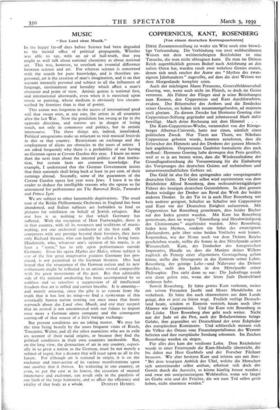MUSIC
"Das Land ohne Musik."
IN the happy far-off days before Science had been degraded to the menial office of political propaganda, Whistler was able to say, with an air of half-truth, that you might as well talk about national chemistry as about national art. This was, however, to overlook an essential difference between science and art. For whereas science is concerned with the search for pure knowledge, and is therefore im- personal, art is the creation of man's imagination, and is on that account intensely personal and subject to all the influences of language, environment and heredity which affect a man's character and point of view. Artistic genius is national first, and international afterwards, even when it is exercised upon music or painting, whose medium is obviously less circum- scribed by frontiers than is that of poetry.
This axiom was forgotten in the access of international good will that swept over, at any rate, the artists in all countries after the last War. Now the pendulum has swung as far in the opposite direction, and nations are in danger of losing touch, not only in commerce and politics, but in artistic intercourse. The three things are, indeed, interlinked. Political antagonisms make us reluctant to visit musical festivals in this or that country. Restrictions on exchange and the employment of aliens are obstacles to the tours of artists. I am asked frequently why there is a probability of our having no German opera at Covent Garden this year. I know no more than the next man about the internal politics of that institu- tion, but certain facts are common knowledge. For example, I understand that the German Government insists that their nationals shall bring back at least 70 per cent. of their earnings abroad. Secondly, some of the guarantors of the Covent Garden opera last year were Jews. I leave it to the reader to deduce the intelligible reasons why the operas so far announced for performance are The Bartered Bride, Turandot and Prince Igor.
We are subject to other lamentable deprivations. The usual tour of the Berlin Philharmonic Orchestra in England has been abandoned, and Italian subjects are forbidden to lend us pictures for exhibition on behalf of Jewish refugees. But our loss is as nothing to that which Germany has suffered. With the exception of Herr Furtwangler, there is in that country, with all its resources and traditions of music- making, not one orchestral conductor of the first rank. Of composers with any prestige beyond their frontiers, they have only Richard Strauss, who can hardly be called a living force. Hindemith, who, whatever one's opinion of his music, is at least a " name," has to rely upon performances outside Germany. Even his opera Mathis der Maier, whose subject is one of the few great imaginative painters Germany has pro- duced, is not permitted in the German theatres. One had hoped that the resurgence of the German nation and its new enthusiasm might be reflected in an artistic revival comparable with the great movements of the past. But that admirable side of the national awakening has been accompanied by so ruthless and so senseless a suppression of all intellectual freedom that art is stifled and cannot breathe. It is amusing—
and merely amusing, since the gibe is so remote from the truth that it has lost its sting—to find a spokesman of this
artistically barren nation trotting out once more that hoary reproach about das Land ohne Musik, and one may suspect that its revival is not unconnected with our failure to import once more a German opera company and the consequent cutting-off of that source of a little foreign exchange.
But present conditions are no joking matter. We may for the time being benefit by the more frequent visits of Busch, Toscanini, Walter, and all the other musicians who are in exile on account of their racial origins, or because they find the political conditions in their own countries intolerable. But, on the long view, the destruction of art in any country, especi- ally in so great a nation as the German, must be not merely a subject of regret, but a disaster that will react upon us all in the future. For although art is national in origin, it is on the exchange and inter-action of its various manifestations upon one another that it thrives. Its withering in one country, or even, to put the case at its lowest, the cessation of mutual intercourse and exchange, can result only in the paralysis of one limb of the large humanity, and so affect the efficiency and
vitality of that body as a whole. DYNELEY HUSSEY.


























































 Previous page
Previous page